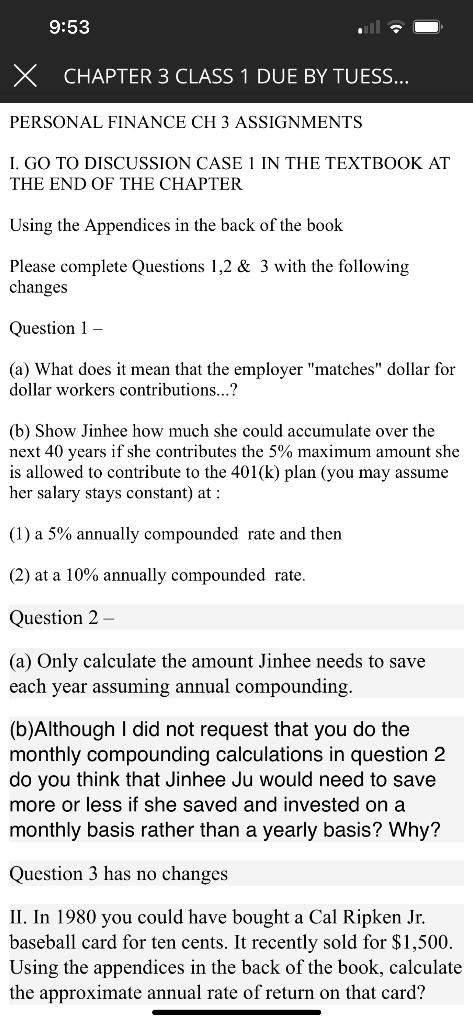
9:53 X CHAPTER 3 CLASS 1 DUE BY TUESS... PERSONAL FINANCE CH 3 ASSIGNMENTS I. GO TO DISCUSSION CASE 1 IN THE TEXTBOOK AT THE END OF THE CHAPTER Using the Appendices in the back of the book Please complete Questions 1,2 & 3 with the following changes Question 1 - (a) What does it mean that the employer "matches" dollar for dollar workers contributions...? (b) Show Jinhee how much she could accumulate over the next 40 years if she contributes the 5% maximum amount she is allowed to contribute to the 401(k) plan (you may assume her salary stays constant) at: (1) a 5% annually compounded rate and then (2) at a 10% annually compounded rate. Question 2 - (a) Only calculate the amount Jinhee needs to save each year assuming annual compounding. (b)Although I did not request that you do the monthly compounding calculations in question 2 do you think that Jinhee Ju would need to save more or less if she saved and invested on a monthly basis rather than a yearly basis? Why? Question 3 has no II. In 1980 you could have bought a Cal Ripken Jr. baseball card for ten cents. It recently sold for $1,500. Using the appendices in the back of the book, calculate the approximate annual rate of return on that card? 9:53 X CHAPTER 3 CLASS 1 DUE BY TUESS... PERSONAL FINANCE CH 3 ASSIGNMENTS I. GO TO DISCUSSION CASE 1 IN THE TEXTBOOK AT THE END OF THE CHAPTER Using the Appendices in the back of the book Please complete Questions 1,2 & 3 with the following changes Question 1 - (a) What does it mean that the employer "matches" dollar for dollar workers contributions...? (b) Show Jinhee how much she could accumulate over the next 40 years if she contributes the 5% maximum amount she is allowed to contribute to the 401(k) plan (you may assume her salary stays constant) at: (1) a 5% annually compounded rate and then (2) at a 10% annually compounded rate. Question 2 - (a) Only calculate the amount Jinhee needs to save each year assuming annual compounding. (b)Although I did not request that you do the monthly compounding calculations in question 2 do you think that Jinhee Ju would need to save more or less if she saved and invested on a monthly basis rather than a yearly basis? Why? Question 3 has no II. In 1980 you could have bought a Cal Ripken Jr. baseball card for ten cents. It recently sold for $1,500. Using the appendices in the back of the book, calculate the approximate annual rate of return on that card







